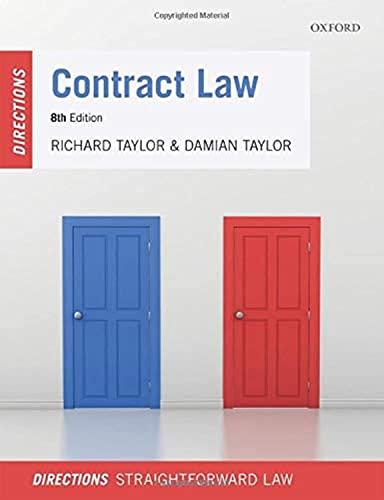Question
1. Discuss the meaning and use of a reservation of property clause in a contract for the international sale of goods. 2. A, who is
1. Discuss the meaning and use of a "reservation of property" clause in a contract for the international sale of goods.
2. A, who is resident in France, uses his computer in his home in France to access an online gambling site operated by a company incorporated in Nevada, which operates its site from a server located in Nevada. He pays $10,000 to open his account with the casino using his credit card issued by a Paris bank. That same day, he loses all $ 10,000 on lost bets.
The next day, he contacts his bank and instructs the bank to reject the $ 10,000 debit from the gambling company.
His contract with his bank entitles him to cancel credit card charges that are "fraudulent".
To justify his claim that the credit card charge is "fraudulent", he argues that his gambling was prohibited under French law, which is indeed the case.
The French bank must decide whether to follow its customer's instruction to reject the gambling casino's claim for payment.
The bank asks for your advice on the solution in law.
3. On April 1, a French exporter of textile weaving machinery receives an e-mail from an American company containing a document on the letterhead of the US firm and which is entitled "Order". The US firm orders a weaving machine from the French exporter and indicates the seller's stock keeping unit reference and a price of 500,000 DDP as per the catalogue, delivery whenever possible.
On April 10, the French exporter decides to accept the order and sends an e-mail back to his US customer with its acceptance of the terms of the order.
But, in the meantime, the US buyer has run into a major problem: his own customer, for whose production it has ordered the French machine, has gone bankrupt and the US firm no longer needs (or wants) the French exporter's machine.
So, on April 5, the American importer had already sent to the French exporter an e-mail cancelling the order.
But the American importer sent the notice of cancellation to an old e-mail address that was listed in its computer records based on information provided many years previously by the French exporter, but not the one mentioned on the current letterhead of the French exporter and to which the order was originally sent. As a result, the French exporter's personnel does not actually see the e-mail or open it.
On April 30, the French exporter advises the American importer that the machine is ready to be shipped.
The American importer send a message that the order had been cancelled as of its message of April 5.
Negotiations to find an amicable settlement fail.
The French exporter is considering suing the buyer the American buyer.
You should assume that:
both the French courts and the American courts will accept jurisdiction, so this is not an issue to be discussed,
the parties agree that the dispute will be settled buy application of the articles of the Convention with respect to the International Sale of Goods.
Which of the parties has the best chances of winning a lawsuit, and what are your reasons for that conclusion?
Step by Step Solution
There are 3 Steps involved in it
Step: 1

Get Instant Access to Expert-Tailored Solutions
See step-by-step solutions with expert insights and AI powered tools for academic success
Step: 2

Step: 3

Ace Your Homework with AI
Get the answers you need in no time with our AI-driven, step-by-step assistance
Get Started


